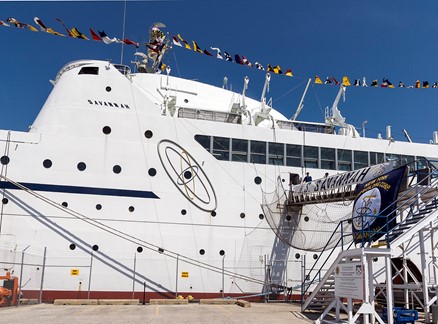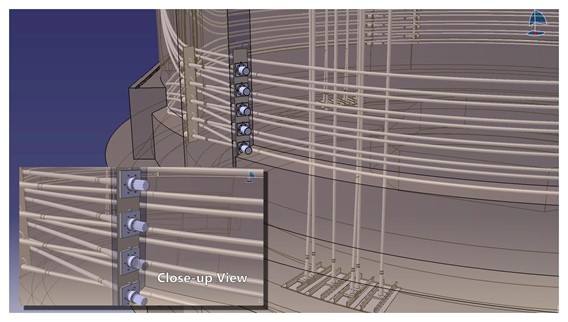NS Savannah at Pier 13 in Baltimore, Md., in 2012.
Utah-based EnergySolutions is joining Radiation Safety and Control Services (RSCS) in the decommissioning of NS Savannah, the world’s first nuclear-powered merchant ship, currently berthed at the Port of Baltimore in Maryland. EnergySolutions announced on March 29 that a joint venture of the two companies, Nuclear Ship Support Services, is conducting the final phases of decommissioning the ship’s reactor, which was defueled in 1975 but remains in place.
Holtec president and chief executive officer Kris Singh (left) and Hyundai E&C president and CEO Yoon Young-Joon at the teaming agreement signing ceremony. (Photo: Holtec)
Holtec International and Hyundai Engineering & Construction have signed an agreement to cooperate in the area of nuclear plant decontamination and decommissioning.
Under the teaming agreement, Hyundai E&C will participate in D&D activities at Holtec-owned decommissioning sites in the United States to build its capabilities and experience in preparation for decommissioning projects in South Korea, which will be undertaken by the two companies. The agreement also provides for the two companies to further expand their cooperation internationally.
The interior of the Submarine 1st Generation Westinghouse prototype, located at the Naval Reactors Facility on the INL site, circa mid-1950s. (Photo: DOE)
The Department of Energy’s Office of Environmental Management (EM) announced on February 10 that it is set to deactivate and demolish the prototype for the reactor used for the USS Nautilus, the world’s first operational nuclear-powered submarine and the first submarine to complete a submerged transit of the North Pole.
The Palisades power plant, in Covert Township, Mich.
The Nuclear Regulatory Commission has approved the transfer of the Palisades nuclear power plant licenses from Entergy Nuclear Operations to Holtec International, as owner, and Holtec Decommissioning International (HDI), as decommissioning operator. Holtec and HDI intend to decommission the single-unit pressurized water reactor, located in Covert, Mich., under an accelerated schedule.
Crews take down the Load-In Facility at the West Valley Demonstration Project. The demolition is scheduled for completion early next year. (Photo: DOE)
The Department of Energy’s Office of Environmental Management (EM) is set to complete the 69th building demolition at the West Valley Demonstration Project early next year, when crews finish knocking down the last structure standing that supported operations at the former Main Plant Process Building.
The Humboldt Bay nuclear power plant as seen from Humboldt Hill in 2010. (Photo: Wikimedia Commons.)
The license for Pacific Gas & Electric Company’s Humboldt Bay Unit 3 nuclear power plant near Eureka, Calif., has been terminated by the Nuclear Regulatory Commission, and the site has been released for unrestricted use. A 65-MWe boiling water reactor plant, Humboldt Bay-3 operated commercially from 1963 to 1976.
Southern California Edison has a plan—and it just might build momentum to solve the nation’s spent nuclear fuel disposal dilemma.
Imagine it’s January 1998. A specially equipped train from the Department of Energy rolls up to the San Onofre Nuclear Generating Station (SONGS) to pick up spent nuclear fuel and take it to the Yucca Mountain repository in Nevada. This scene is repeated thousands of times at nuclear plant sites across the U.S. over the ensuing decades. The solution to permanent spent fuel disposal as outlined in the Nuclear Waste Policy Act (and its amendments) is working as intended. The nation’s commercial spent fuel is safely isolated deep underground for the long term.
But that is not what happened. Work on Yucca Mountain has been stalled for a full decade, and the organization within the DOE that by law is responsible for managing the spent fuel program has been defunded and disbanded.
Wisconsin’s Kewaunee nuclear power plant, which shut down in 2013, is being transitioned to decommissioning. (Photo: Wikimedia Commons)
The Nuclear Regulatory Commission on Wednesday approved a proposed rule to amend its regulations for nuclear power plants that are transitioning from operations to decommissioning. After changes requested by the NRC commissioners are made by agency staff, the proposed rule will be published in the Federal Register, initiating a 75-day comment period.
The La Crosse site in 2019 with major decommissioning completed. The coal-fired Genoa plant is in the background. (Photo: EnergySolutions)
The Nuclear Regulatory Commission has extended its orders transferring the licenses for the La Crosse and Zion nuclear power plants from EnergySolutions back to the plant owners until late 2022. This is the third time the NRC has extended the effectiveness of the license transfer orders for the decommissioned plants since approving them in 2019.
NorthStar is challenging the sale of Kewaunee to EnergySolutions. (Photo: Dominion Generation)
NorthStar Group Services is being allowed to intervene in Wisconsin’s regulatory review of the sale of the Kewaunee nuclear power plant by Dominion Energy to EnergySolutions for decommissioning. An administrative law judge granted NorthStar permission on September 7 to participate in the Public Service Commission of Wisconsin’s review of the transaction.
A graphic representation of the tendons encircling the San Onofre containment domes. (Image: SCE)
A nearly yearlong effort to de-tension and remove more than 400 steel cables, known as tendons, from the two containment domes of the San Onofre Nuclear Generating Station (SONGS) was recently completed, with only one minor first aid incident recorded, according to Southern California Edison.
Vattenfall’s Christopher Eckerberg (left) and Aziz Dag of Westinghouse Electric Sweden AB sign the agreement for decommissioning of large radioactive components at Sweden’s Ringhals-1 and -2. (Photo: Vattenfall/John Guthed)
Westinghouse will segment and dispose of the reactor internals and pressure vessels at Sweden’s Ringhals-1 and Ringhals-2 under a deal announced last week with plant owner Vattenfall. Unit 2, a pressurized water reactor, and Unit 1, a boiling water reactor, were shut down in 2019 and 2020, respectively, after operating for more than 40 years.



.png)














 and Aziz Dag of Westinghouse Electric Sweden AB.jpg)